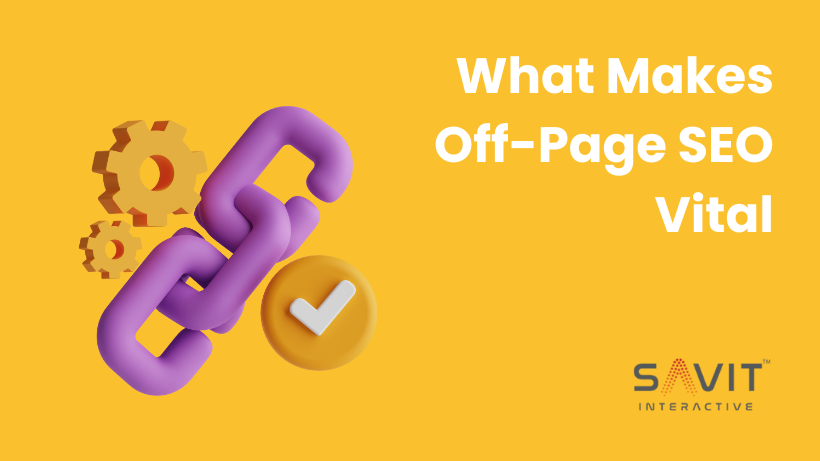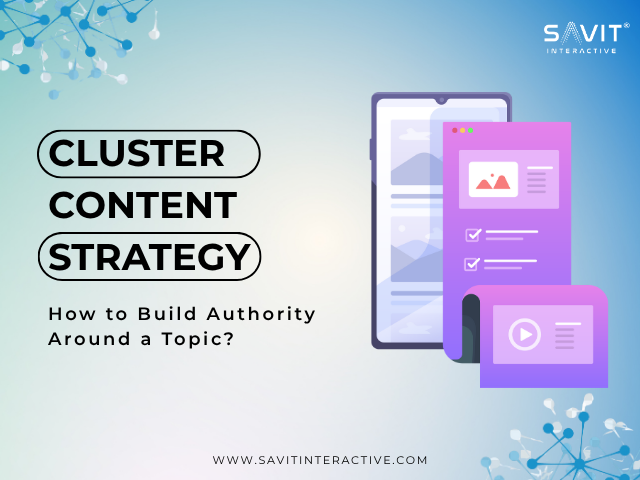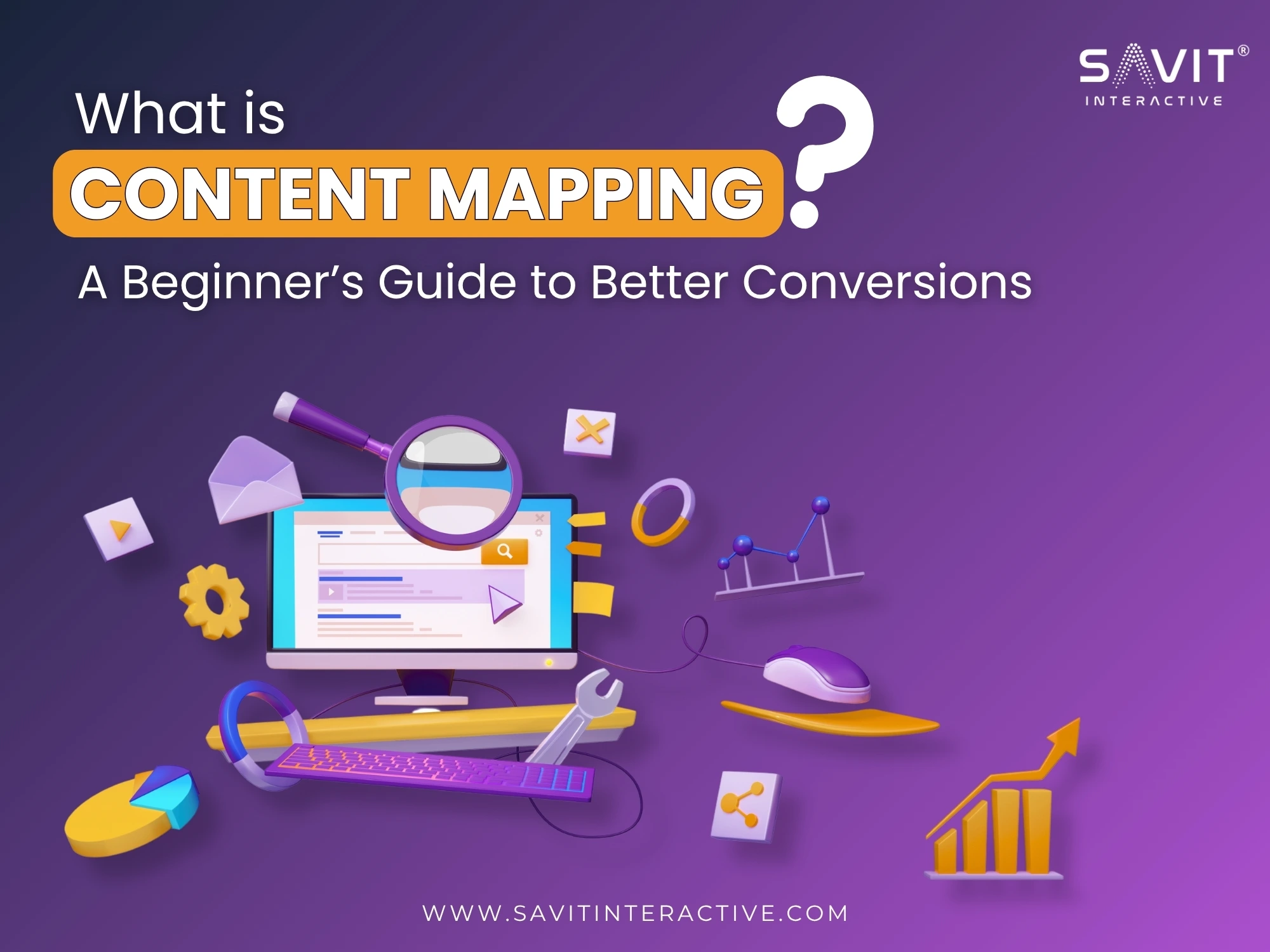Off-Page SEO are techniques implemented for boosting a website’s online reputation and domain authority with the goal of increasing its search rankings. Contrary to how On-Page SEO works, i.e., by optimizing content towards its utmost relevancy and updating the website structure, Off-Page SEO works by leaving your mark on external platforms through link-building and increasing brand mentions.
Savit Interactive has prepared this blog to help you understand how Off-Page SEO works to drive more organic traffic to a particular website of your choice.
Why Are Off-Page Activities Significant in SEO?
Ideally Off-Page SEO is widely carried out by attaining valuable backlinks from reputable sources, contributing guest posts related to the website’s niche, and actively engaging in forum discussions to promote brand mentions.
These efforts help search engines perceive the website as reliable and appropriate in terms of users’ specific niche-related queries. This phenomenon ultimately leads to enhanced rankings within search results for the business website’s operating niche.
As the website gains traction in the eyes of search engines, it becomes more prominently featured in search engine listings, attracting a larger number of visitors who are likely to engage with its content. This increased visibility and authority within your online competitors will attract a greater influx of organic traffic over time.
To simplify the significance of Off-Page SEO, lets break down its direct impact on SEO Campaigns:
- Increased Organic and Referral Traffic: Off-page SEO efforts broaden the reach of your website across the internet, attracting more organic traffic from search engines and referral traffic from other websites.
- Quicker Indexing: By improving your website’s Domain Authority through off-page SEO techniques, search engines are more likely to prioritize indexing your site, leading to faster inclusion in search results.
What are the essential factors to consider while performing Off-page SEO?
As you read through this Off-Page SEO guide to learn why implementing this strategy on your website is important, we trust it will expand your understanding of the factors influencing your Off-Page SEO progress. The factors include:
1. Domain Authority
A domain authority is a distinct quantifiable metric which predicts how likely a website is to rank in search engine result pages by flagging it with scores. These scores range from 1 to 100.
Why Should One Care About Domain Authority?
From the vast sea of websites churning out content every day, the race for visibility is intense. To stand out in this crowd, search engines rely on a credibility ranking system called domain authority (DA). Essentially, DA acts as a scorecard, helping search engines determine which sites are more trustworthy and should be prioritized. And aiming for a strong DA can bring the following added benefits to your website:
- Understand site credibility: DA provides insight into how search engines perceive your site’s trustworthiness.
- Compare to competition: It helps you see how your site fares against others in your field.
- Build backlinks: Getting other sites to link to yours boosts your DA, showing that your content is valued by others.
- Measure digital marketing: Use the change in DA of your website to gauge the effectiveness of your online marketing strategies.
2. Relevant Links
While having a high number of backlinks can improve your DA score, do not forget to consider their quality. Even if a link comes from a reputable source, if it’s not relevant to your business focus, it won’t add much value to your efforts. At our SEO company in USA, we believe the phrase ‘quality over quantity’ holds true in this matter.
Why Relevant Links Matter in Off-Page SEO:
- Signals of authority: Search engines see backlinks as endorsements for your content, boosting your website’s credibility.
- Indicators of content quality: When reputable and relevant sites link to your content, it validates its quality and relevance.
- Enhance user experience: Relevant links make it easier for users to navigate to additional relevant information.
- Measure expertise, authority, and trust: Links are an integral part of search engine ranking factors, helping assess a site’s authority and trustworthiness.
3. Site Traffic
The number of visitors arriving at your website through guest posting is crucial in Off-Page SEO because it indicates how effective your guest posting efforts are. More traffic from guest posts means that your content is catching the attention of the audience on the sites where you’re contributing. You can utilize off-page SEO tools like SEO Meta in 1 Click for this purpose.
Yet, it’s not just about the numbers; the quality of the traffic is equally important. Quality traffic consists of visitors who are genuinely interested in your content, products, or services and are more likely to engage, convert, or return to your site.
When guest posts drive high-quality traffic, it suggests that your content resonates well with the audience of the sites where you’re contributing. These visitors tend to spend more time on your site, explore various pages, and may even make purchases or take desired actions. This not only boosts your brand’s visibility but also aids in cultivating a loyal customer base.
By carefully assessing the significance of both quantity and audience demographics for quality, you can choose the right guest posting opportunities to enhance your off-page activities.
4. Link Type
Off-Page SEO heavily depends on the type of links used in backlinks because the quality and relevance of these links directly impact a website’s search engine rankings and overall online visibility. However, not all backlinks provide the same impact. And understanding this marks the first step towards making quality backlinks.
Different types of links used in the process of link building:
- Follow Links:
Follow links, also known as dofollow links, are standard hyperlinks that allow search engine crawlers to follow them and pass authority from the linking site to the linked site. These links contribute positively to a website’s search engine rankings and authority. In Off-Page SEO, acquiring follow links from authoritative and relevant websites is as difficult as it is crucial for enhancing a site’s credibility and visibility. Search engines prioritize the following links when evaluating a website’s backlink profile, considering them as signals of trust. - Nofollow Links:
Nofollow links, as the name suggests, instruct search engine crawlers not to follow them or pass authority from the linking site to the linked site. These links contain the rel=”nofollow” attribute in their HTML code. While nofollow links do not directly impact a website’s search engine rankings, they still have value in Off-Page SEO. Nofollow links can drive referral traffic, increase brand exposure, and diversify a website’s backlink profile. They serve as a natural aspect of a healthy link profile, indicating that the website attracts attention from various sources and the business is not spamming other websites for link juice.
Weightage Of “Dofollow” and “NoFollow” Links in Off-Page SEO:
While follow links typically carry more weight in Off-Page SEO due to their ability to pass authority, nofollow links should not be overlooked. Search engines consider a combination of follow and nofollow links when evaluating a website’s link profile. A natural and diverse mix of both types of links indicates organic link-building practices and enhances a website’s credibility. Therefore, Off-Page SEO strategies should aim to acquire a balanced combination of follow and nofollow links from reputable and relevant sources to achieve optimal results in search engine rankings and organic traffic growth.
Link Types Are Alternatively Categorized As:
Different types of links include:
- Natural/Earned Links:
Natural links occur when other bloggers, webmasters, or site owners link to your web page because they find your content valuable and relevant to their audience. This usually happens when your content is high-quality and authoritative in its field. - Built Links:
Built links are acquired through manual efforts. This means reaching out to other website owners, bloggers, or webmasters to feature your content through links or guest posts. Building these links requires establishing credibility and recognition within your industry. - Created Links:
Created links are intentionally made by website owners to signal to search engines that their links are significant. These can include backlinks placed in forum posts or blog comments. It’s important to note that not all created links are beneficial for SEO; some may even harm your rankings. - Broken Links:
Broken links are links on websites that no longer lead to valid pages. These can occur due to changes in URLs or website restructuring. Fixing broken links on your own site and reaching out to website owners to replace broken links with yours can be a strategy for link building.
Types of Off-page SEO Activities
Your integrity status with search engines heavily relies on link building. It’s crucial for businesses to diversify their efforts in this area. Relying solely on one type of link building strategy exposes you to risks from algorithm changes and shifts in industry trends. Diversifying allows you to adjust more effectively to these changes and ensures a consistent flow of backlinks from various platforms, expanding your reach.
The experts at our SEO Company in USA always aim to diversify their backlink profiles to make them seem more organic to search engines. This helps in reducing the risk of penalties for relying too heavily on a single type of backlink. Different types of link building strategies known in SEO world comprise of:
Guest Blogging:
- Contribute high-quality guest posts to relevant websites in your niche.
- Include a backlink to your site within the content or author bio.
Q&A Forums:
- Participate in forums like Quora or Reddit, answering questions related to your industry.
- Include relevant links to your site when they add value to your answers.
Local Citations:
- Ensure your business information (name, address, phone number) is consistent across local directories and review sites.
- Claim and optimize your Google My Business listing.
- Considering the accuracy this task demands, it is advisable to rely on a local citation service provider.
Video/Image Submissions:
- Create visually appealing content like slideshows or infographics.
- Share them on platforms like Pinterest, ensuring they link back to your website for more information.
Classified Posting:
- Involves submitting advertisements or listings of products, services, or jobs to classified ad websites.
- These ads typically include a link back to the website in focus, helping to increase its visibility and potentially drive traffic interested in the business concerned.
Social Bookmarking:
- Refers to the practice of saving and organizing links to webpages on social bookmarking platforms.
- By submitting your links to social bookmarking sites, search engines can readily crawl and index them, resulting in faster indexing of your website.
Bottom Line:
Off-page SEO appears straightforward on the surface, yet its implementation can be time-consuming. This scenario often leads individuals to shy away from it or underestimate its significance, simplifying it merely as a matter of linking.
It is important to understand that Off-Page SEO not only enhances your website’s visibility but also opens various marketing channels other than your website. Such exposure boosts your online presence, whether it is achieved through direct efforts or other entities promoting your brand upon interacting with your content or were merely impressed by your past services
At Savit Interactive, we know how vital Off-Page SEO is. That’s why we employ these strategies for our clients, helping them gain the visibility they counted on us to deliver. Contact us to learn more about our SEO services wherein we use similar Off-page SEO strategies as outlined in the blog.



